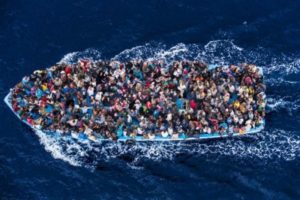Are NGOs contributing to drownings in the Med?
As the deaths among migrants crossing the Mediterranean Sea begin to rise again with the approach of the northern summer, questions are being asked about whether NGOs bear some responsibility for the toll.
Last year was an extraordinarily deadly 12 months for migrants with 5,000 people perishing on the crossing – up from 3,700 in 2015.
In the first six months of 2017, more than 1700 deaths have been recorded.
These tragedies are not new and refugee advocacy groups have been recording the death toll since the 1990s. But now they don’t simply tally up the dead, they directly intervene by rescuing migrants at sea.
 It started in 2014 with the discontinuation of the Italian navy’s humanitarian operation Mare Nostrum after the cost of the operation became too high for the Italian government, which was unable to convince its European partners to join its efforts.
It started in 2014 with the discontinuation of the Italian navy’s humanitarian operation Mare Nostrum after the cost of the operation became too high for the Italian government, which was unable to convince its European partners to join its efforts.
The program was replaced by operation Triton, financed by the European border agency Frontex.
At the time NGOs feared that the change would lead to the deaths of thousands of migrants. Triton has a lower budget than Mare Nostrum and only operates in a small section of the Mediterranean.
Launched by a couple of Italian-American millionaires, the Migrant Offshore Aid Station (MOAS) was the first private organisation of its kind to charter a boat.
In 2015, Doctors without Borders (MSF) followed their lead, as did Save the Children in 2016. Other groups have since joined with the number of different authorities and organisations involved making rescue operations more complex.
In Italy, the role of NGOs in rescue operations has created controversy. A report in the Financial Times last year revealed Frontex’ reservations about sea rescue operations.
The report said that Frontex believes letting migrants think that all they have to do is take to the sea to be rescued and welcomed to Europe opens up the floodgates.
According to the British newspaper, Frontex has evidence that some NGOs are in contact with smugglers and direct them towards zones where migrants have the best chance of being rescued.
They claim these NGOs are accomplices to human traffickers and are therefore guilty of the crime of assisting illegal immigration.
The FT report led to an Italian investigation. The Italian senate’s parliamentary inquiry concluded in May finding that NGOs constitute a “pull factor” and that they should cooperate more with maritime police operations.
But the issue is a vexed one. The UN High Commission for Refugees (UNHCR) defended the NGOs, while the International Organisation for Migration (IOM) gave support to Frontex’s arguments, while still highlighting the importance of saving lives.
Researchers Charles Heller and Lorenzo Pezzani, in a report titled ‘Blaming the Rescuers’ refuted Frontex’s claims and pointed out that the border force also accused operation Mare Nostrum of encouraging illegal immigration.
Yet the end of the Mare Nostrum operation, far from limiting fatalities, led to an increase in deaths.
The debate highlights contradictions in European migration policies, which are creating a prohibition effect. When it is impossible to get something legally – in this case access to Europe – demand seeks out illicit avenues which gives rise to unscrupulous profiteering.
French researchers Antione Pecoud and Marta Esperti argue that strengthening border control, especially on land results in more risky boat journeys and ultimately and therefore a rise in the number of deaths at sea.
They say the humanitarian aim of saving lives conflicts with government efforts to control immigration.
“Behind the controversy lies the question of legitimacy. Who has the right to intervene and come to migrants’ rescue?” the pair say.
“Frontex defends the right of governments to control their borders and exercise sovereignty. NGOs have another perspective: if national governments are unable to uphold certain fundamental rights, such as the right to life, civil society must intervene,” they say.
“To an extent, the crisis in the Mediterranean enables NGOs to challenge state control over borders. And it’s understandable that this creates resistance. But if governments wish to defend their monopoly, they should find better arguments than those put forward by Frontex.”
Laurie Nowell
AMES Australia Senior Journalist












